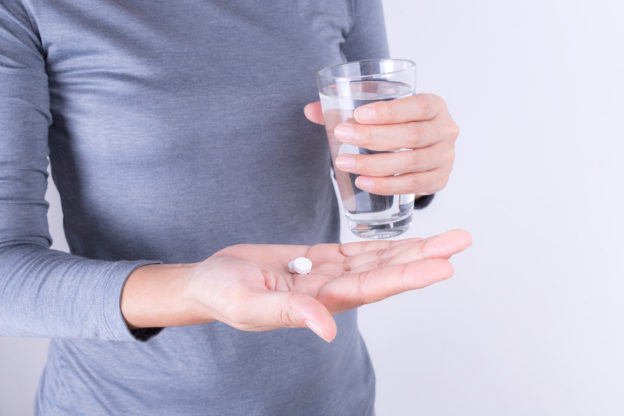By David Blyweiss, M.D., Advanced Natural Wellness
June 20, 2018
- Why iron testing is so important
- What happens if you have iron overload?
- Iron deficiency anemia is on the rise
Iron is widely known as the “anemia” supplement. If your iron supplies are low, you may experience symptoms of anemia such as fatigue, weakness with signs of anemia being pale or yellowish skin color.
Low levels of iron are also a well-known cause of hair loss. Restless leg syndrome is another condition that has a direct link with iron deficiency.
So it’s not uncommon for people who feel fatigued, think their hair is thinning or experience frequent bouts of restless leg syndrome to run out and buy a bottle of iron pills and start taking them every day.
This is not a good idea.
MD Exposes the Hidden Danger to Your Eyes

When your eyesight starts to fail, it's a real problem. Suddenly you can't go to the grocery store... you can't get to the doctor if you have an emergency... you can't meet your friends for dinner…
Your "regular" doctor doesn't have time to keep up with the latest research. And the same goes for eye doctors. They go to school to learn how to fit you for glasses and contacts, but have no way of preventing the damage and loss of eyesight that threatens your freedom and independence.
Let me show you something that explains a LOT about how your eyes work.
In my FREE Special Report, I'll show you a HUGE, untapped resource for your eyes that safely and naturally restores clear, effortless eyesight.
Click here to get started...
High levels of iron in the blood are toxic, and just as dangerous as low levels of it. This is why I NEVER recommend taking an iron supplement unless you are diagnosed with an iron deficiency by a medical professional and closely monitored.
All it takes is a simple blood test (called a “serum ferritin test) to measure your iron stores. I advocate getting tested annually to make sure your iron levels are neither to low… nor too high.
Let’s take a look at what you should do when you get your results back.
What happens if you have Iron Overload?
The truth is, iron overload can be just as damaging to your health as iron insufficiency. That’s because, unlike many other nutrients, iron can build up in your system over time and become toxic. There is simply no release valve for it.
Very small amounts are excreted in your urine. But the only truly effective way to release your iron burden is to bleed on a regular basis, which isn’t something you don’t normally do unless you’re menstruating.
Depending on the organs affected by excess iron, symptoms of overload could include abdominal pain, joint pain, impotence, irregular heart rhythm, heart failure and new-onset diabetes.
Are You Suffering From...
- Love handles and a pot belly
- Romance that isn't what it used to
- Forgetfulness and inattention
- Low (or no) strength and endurance
- A sex drive that's shifted into neutral...or worse
If so...you may have Mature Male Burnout. Click here to discover more about this unique condition and what you can do about it.
Over the long term, iron overload can ultimately result in arthritis, liver disease, heart damage and endocrine disorders.
If you are diagnosed with iron overload, there are some simple actions you can take to reduce your load.
- The quickest way to lower your iron levels is to donate blood on a regular basis. If you are unable to donate blood, your doctor can give you a prescription for therapeutic phlebotomy.
- Heme iron, which is found in animal protein, is the most absorbable dietary source of iron. I generally recommend that my patients limit animal proteins to 15% of their diet. If you have a high iron burden, you may want to reduce that even further.
- Vitamin C greatly increases the bioavailability iron. So it’s a good idea to avoid taking vitamin C – or eating produce high in vitamin C – with foods that are rich in iron.
- Curcumin is a natural iron chelating agent. In animal models, curcuminoids bind with iron and alleviate iron toxicity. You can eat more curcumin-rich foods, but your best bet is to look for a curcumin supplement that contains at least 90% to 95% curcuminoids. The formula should also include black pepper, which substantially increases its bioavailability.
Iron Deficiency Anemia is on the Rise
It’s hard to imagine, but the incidence of iron deficiency anemia is on the rise. Over a period of less than 10 years rates nearly doubled.
In men, the increased risk of anemia was steady as they aged. Women, on the other hand, appeared to have peak anemia rates between the ages of 40 and 49, and between the ages of 80 and 85.
Now, when you imagine the health consequences of anemia you probably think of constant fatigue, pale skin and weakness. But anemia is much more serious than that.
Untreated iron deficiency anemia can lead to heart problems, increased risk of infections, depression, reduced cognitive function and an increased chance of early death.
If your iron stores are low your doctor will likely place you on an iron supplement with a recommended dosage that is appropriate for you. (The most commonly prescribed form is ferrous sulfate at about 325 mg three times daily.)
Unfortunately, supplementing with iron can come with some pretty unpleasant gastrointestinal effects. If you can’t handle them, ask your doctor about getting a controlled-release formula. They have fewer side effects, but they also have lower bioavailability and come with a higher price tag.
SOURCES:
Guo EL, et al. Diet and hair loss: effects of nutrient deficiency and supplement use. Dermatol Pract Concept. 2017 Jan; 7(1): 1–10.
Guo S, et al. Restless Legs Syndrome: From Pathophysiology to Clinical Diagnosis and Management. Front Aging Neurosci. 2017; 9: 171.
Makker J, et al. Dysmetabolic Hyperferritinemia: All Iron Overload Is Not Hemochromatosis. Case Rep Gastroenterol 2015;9:7-14
Thephinlap C, et al. Efficacy of curcuminoids in alleviation of iron overload and lipid peroxidation in thalassemic mice. Medicinal Chemistry. 2009;5:5:474–482.
Le CHH. The Prevalence of Anemia and Moderate-Severe Anemia in the US Population (NHANES 2003-2012). PLoS One. 2016; 11(11): e0166635.







